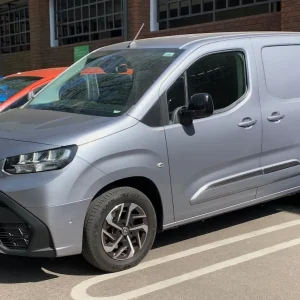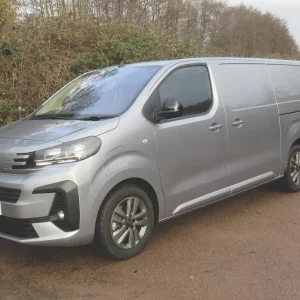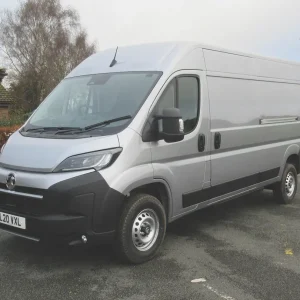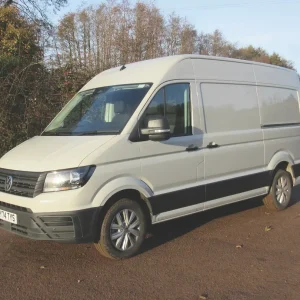DFSK has launched a range of Big Cab and 4WD LCVs to go alongside its Loadhopper line-up.
The 4WD range consists of the Loadhopper Single Cab Pick-up and Tipper and the Big Cab Pick-up, Tipper and Dropside. Prices start at £12,995 for the Single Cab Pick-up (all prices listed here exclude VAT), which seems a bit steep for such an unrefined vehicle – the Great Wall Stead pick-up is not much more at £13,998, and the biggest selling point for the DFSK Loadhopper models is their rock-bottom prices. However, the entry-level Big Cab model without 4WD, the 1.3-litre pick-up, is a more palatable £9495.
Describing the 4×4 vehicles as “manoeuverable and compact”, DFSK says they are “ideal for operators who need a cost-efficient vehicle with a generous payload that can operate in tight, confined areas and in all conditions”. The 4WD derivatives are fitted with a switchable two- and four-wheel drive system that also comes with a lever to select high- or low-range gearing to suit the conditions. No limited slip differential is fitted, but DFSK claims the German-engineered system is tried and tested and proven to work in extreme weather conditions.
“This is a relatively simple 4WD system that is really intended for off-road use only in slippery conditions and not as full-time 4WD,” a DFSK spokesman explains.
We confess to not having driven the van tested here, the 4WD Big Cab Dropside (priced at £15,395), off-road; the most treacherous conditions we encountered were a labyrinth of narrow, winding country lanes in Kent and a sudden, heavy thunderstorm in London, both of which the little load-lugger negotiated without any drama.
The Dropside, like the other 4×4 models, is powered by a 1.3-litre four-cylinder petrol engine with power output of 75hp wedded to a five-speed manual gearbox.It has a thirsty-looking official fuel consumption on the combined cycle of 36mpg and CO2 of 184g/km. The payload, however, is an impressive 907kg, which is considerably better than the 687kg offered by the Big Cab Tipper and Pick-up.
Once in the cabin of the forward-control LCV it’s hard not to get a queasy feeling that there’s not much protecting you from anything that might be encountered head-on. The width of the top of the dashboard before it meets the windscreen is extremely narrow by today’s standards.
The gear change is pretty slick as you pick up speed, but by the time you get to about 28mph the engine is straining to be put into fifth gear, and the considerable racket it creates, together with the not insubstantial road noise, means the driver is likely to oblige. The Big Cab Dropside has a flat-out limit of around 55mph, but by this speed the wing mirrors are vibrating so much it is difficult to get a decent view of the traffic approaching rapidly from behind; the rear-view mirror is a better bet.
There is no clock and not much serviceable stowage space in the cab. It contains lots of small cubbyholes suitable for paper clips or pencil stubs, but nowhere to put a smartphone. On the other hand, the Big Cab does offer a decent amount of space behind the seats for storing tools or jackets.
You also have to put the key in the doors to open the vehicle, and use the driver’s side if you want to open them both at once. There is a radio, too, which is fine at low speeds, but it cannot compete with noise levels once out on the open road. The seat has an adjustable backrest and moves backwards and forwards – it’s not comfortable, but nobody is likely to use the Big Cab Dropside for long journeys.
DFSK currently has 34 dealerships in the UK, including four recently appointed DFSK Professional franchise outlets dedicated to selling commercial vehicles, which have taken on the Big Cab models as the smallest vehicles in their portfolios. These businesses are Beech’s Garage in Stoke, TIM Commercials in Ilkeston, Boyton Cross in Enfield, and Cumbria Truck Centre in Carlisle.
DFSK says it aims to grow this franchise to 40 dealerships in an overall network comprised of 80 outlets, which it aims to have in place in around 12 months’ time.
“The Big Cab chassis cab models with their increased flexibility and payloads will only be sold by DFSK Professional dealers,” says the spokesman.
“We are looking to introduce a new, slightly larger model in 2015, which will feature a diesel engine and higher payload while still maintaining the compact size.
“We anticipate that as we introduce diesel and a new vehicle with a larger 1.0-tonne-plus payload into the range, then more commercial dealers will wish to sell DFSK.” But he maintains that petrol engines are better suited to the short urban journeys, for which the DFSK range is typically used, than diesels because they are not prone to blocked diesel particulate filters, and notes that Ford has introduced the 1.0-litre petrol Ecoboost engine to its Transit Connect line-up as an option for urban operators.
Electronic stability control becomes mandatory on all new LCVs produced for the UK from November 2014, but DFSK claims ESC is not a requirement for the approval type it currently uses. However, the firm says it is looking to have it fitted to its vehicles from June 2015.
Verdict:
Decent payload capacity and its off-road capability means the 4WD Big Cab Dropside will have appeal but the lack of refinement is a considerable drawback





